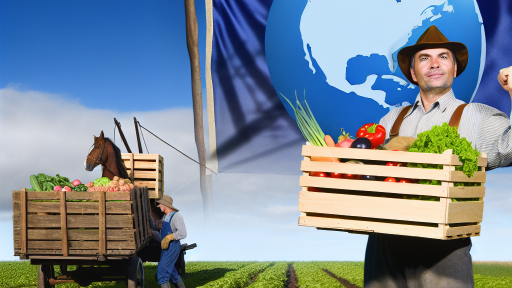Introduction
Agri supply chain technology refers to the use of technology to improve the process of agricultural supply chains.
Advanced tracking systems, IoT sensors, and data analytics optimize resource management, reduce waste, and ensure product quality.
Blockchain enhances transparency and traceability, bolstering consumer trust.
From precision agriculture to smart logistics, innovative technologies empower farmers and stakeholders to meet growing demands sustainably while navigating challenges such as climate change and market volatility.
The importance of understanding policy impacts
Understanding policy impacts is crucial as it directly influences the adoption and success of agri supply chain tech.
Policies shape our daily lives, influencing everything from healthcare and education to the environment and economy.
By comprehending policy impacts, individuals and organizations can engage meaningfully in public discourse, hold decision-makers accountable, and work towards creating positive change that aligns with societal needs and values.
Overview of Agri Supply Chain Technology
The concept of Agri supply chain technology
The concept of Agri supply chain technology is the application of technological solutions to improve the efficiency and effectiveness of agricultural supply chains.
These technologies are revolutionizing the Agri supply chain by enhancing visibility, traceability, and collaboration among stakeholders.
They help in streamlining processes, reducing waste, minimizing risks, and improving overall supply chain performance.
The adoption of Agri supply chain technology has numerous benefits for different players in the agricultural sector.
Farmers can optimize their operations, achieve higher yields, and access wider markets.
Agribusinesses can gain better control over their supply chains, optimize inventory management, and reduce costs.
Consumers, on the other hand, can benefit from improved product quality, increased food safety, and greater transparency in the origin and journey of their food.
However, the implementation of Agri supply chain technology is not without challenges.
Transform Your Agribusiness
Unlock your farm's potential with expert advice tailored to your needs. Get actionable steps that drive real results.
Get StartedOne of the key obstacles is the digital divide, especially in rural and remote areas where access to internet connectivity and technological infrastructure is limited.
Another challenge is the cost associated with adopting and maintaining these technologies, particularly for small-scale farmers who may have limited financial resources.
Policies and regulations play a crucial role in facilitating the adoption and successful implementation of Agri supply chain technology.
Governments need to invest in digital infrastructure, provide incentives for technology adoption, and develop supportive frameworks for data privacy and security.
Collaboration between public and private sectors is essential to create an enabling environment for innovation and technology transfer in the agricultural sector.
Examples of technology used in Agri supply chain management include
Understanding policy impacts is crucial as it directly influences the adoption and success of Agri supply chain tech.
- Electronic Data Interchange (EDI) for seamless communication and data exchange between stakeholders.
- GPS and satellite technology for real-time tracking and monitoring of agricultural products during transit.
- Internet of Things (IoT) devices to collect data on temperature, humidity, and other parameters to ensure product quality and traceability.
- Drones and unmanned aerial vehicles (UAVs) to survey and analyze crop conditions, assess field boundaries, and monitor livestock.
- Blockchain technology for secure and transparent recording of transactions and supply chain data.
- Artificial Intelligence (AI) and machine learning algorithms to optimize production, predict harvest yields, and manage inventory levels.
- Mobile applications and online platforms for farmers to access market information, connect with buyers, and negotiate prices.
- Robotic automation for harvesting, sorting, and packaging agricultural products.
- Data analytics and predictive modeling to forecast demand, identify market trends, and make informed business decisions.
In essence, Agri supply chain technology holds immense potential to transform the agricultural sector by improving efficiency, sustainability, and profitability.
The use of advanced technologies offers a wide range of benefits for farmers, agribusinesses, and consumers.
However, addressing challenges related to infrastructure, affordability, and policy frameworks is vital to ensure equitable access and widespread adoption of these technologies.
Read: Water Rights and Farming Regulations
Importance of Policy in Agri Supply Chain Tech
Policy impacts the development and adoption of Agri supply chain technology by providing guidelines and regulations.
Government regulations play a crucial role in shaping the Agri supply chain industry.
How policy impacts the development and adoption of Agri supply chain technology
- Policies ensure the safety and quality of agricultural products throughout the supply chain.
- Regulations govern the use of technology in farming practices to protect the environment.
- Policy frameworks encourage the development of innovative Agri supply chain technologies.
- Government intervention can provide financial support and incentives to promote technology adoption.
- Clear policies create a favorable environment for investment in Agri supply chain technology.
- Monitoring and enforcement of policies ensure compliance and fair competition among technology providers.
- Policies facilitate collaboration between government, farmers, and technology companies for effective implementation.
- Responsive policies enable agility in adapting to changing market and technological trends.
- Policies encourage data sharing and interoperability among different technology solutions in the supply chain.
- Regulations promote transparency, traceability, and accountability in the Agri supply chain.
- Policies address privacy and data security concerns related to the use of technology in the supply chain.
- Inclusive policies promote equitable access to technology, benefiting small-scale and marginalized farmers.
- Policies drive standardization and compatibility of technology solutions across the Agri supply chain.
- Regulatory frameworks guide the integration of emerging technologies like blockchain, IoT, and data analytics.
- Policies govern the use of automation and robotics in Agri supply chain activities, improving efficiency and reducing costs.
- Clear policies enable effective disaster response and risk management in the Agri supply chain.
- Government support in creating policies that align with sustainable development goals promotes responsible and ethical practices.
- Policies address legal and liability issues arising from the use of technology in Agri supply chain activities.
- Regulations ensure fair pricing and prevent exploitation of farmers through technology-driven market manipulation.
- Policies ensure fair trade practices and protect small-scale farmers from unfair competition by large corporations.
The role of government regulations in shaping the industry
- Government regulations set safety standards to ensure food security and protect consumers.
- Policies guide the integration of technology to enhance productivity and efficiency in the Agri supply chain.
- Regulations foster trust and confidence among stakeholders in the Agri supply chain ecosystem.
- Government oversight ensures compliance with labor and employment regulations in agricultural activities.
- Policies promote sustainability by encouraging eco-friendly practices and reducing environmental impact.
- Regulatory frameworks address the ethical implications of technology use, such as genetic modification and cloning.
- Policies create a level playing field for all participants in the Agri supply chain, preventing monopolies.
- Government intervention through regulations prevents the exploitation of farmers and promotes fair trade.
- Policies support research and development in Agri supply chain technologies to drive innovation.
- Regulatory bodies monitor and evaluate the impact of technology adoption on the Agri supply chain ecosystem.
- Government regulations protect intellectual property rights and incentivize investment in research and development.
- Policies encourage the adoption of sustainable farming practices to mitigate climate change and promote resilience.
- Regulations ensure biosecurity and prevent the spread of pests and diseases through the Agri supply chain.
- Policies address socioeconomic issues, such as rural development and poverty reduction through technology-enabled agriculture.
- Government regulations enable effective crisis management and response in the Agri supply chain.
- Regulatory frameworks promote compliance with international trade standards and agreements.
- Policies facilitate the integration of small-scale farmers into modern supply chains, improving their livelihoods.
- Government regulations enforce fair labor practices and protect workers’ rights in the Agri supply chain.
- Policies foster cooperation and knowledge sharing among countries to improve global food security.
- Regulatory bodies conduct regular audits and inspections to ensure adherence to policies and regulations.
Policy profoundly influences Agri supply chain technology development and adoption, offering guidelines, regulations, and incentives.
It ensures safety, sustainability, and fairness, fostering innovation and collaboration while addressing ethical, environmental, and socioeconomic concerns.
By championing responsible practices and safeguarding stakeholders’ interests, policies create a robust and sustainable Agri supply chain ecosystem.
Read: Organic Farming Compliance: A Quick Overview
Policy Impacts on Agri Supply Chain Tech
Policies play a crucial role in shaping the Agri supply chain technology landscape.
By analyzing specific policies, their impacts on trade, the environment, and labor management within the industry can be understood.
Trade policies can either hinder or foster the development and distribution of Agri supply chain tech.
Restrictive trade policies limit access to international markets, stifling growth.
Conversely, favorable trade policies stimulate innovation and promote the adoption of advanced technologies. Free trade agreements facilitate technology transfer and collaboration.
Environmental policies significantly influence the adoption of sustainable practices within the supply chain.
Mandatory environmental regulations push companies to implement eco-friendly technologies, reducing waste and promoting green logistics.
Government incentives and subsidies further encourage the adoption of sustainable technologies.
Showcase Your Farming Business
Publish your professional farming services profile on our blog for a one-time fee of $200 and reach a dedicated audience of farmers and agribusiness owners.
Publish Your ProfileBy aligning environmental goals with supply chain practices, policies contribute to a more sustainable and resilient Agri supply chain.
Labor policies directly impact HR management in the Agri supply chain industry.
Stringent regulations can increase costs and limit workforce flexibility, affecting supply chain efficiency.
Complying with labor policies regarding fair wages and safe working conditions is essential for ethical supply chain management.
Policies that promote worker empowerment and training contribute to improved productivity and job satisfaction.
Effective HR policies result in a skilled and motivated workforce, enhancing overall supply chain performance.
Specific policies and their impacts on the Agri supply chain technology
Impact of trade policies on the development and distribution of Agri supply chain tech
- Trade policies play a crucial role in shaping the development and distribution of Agri supply chain technology.
- Restrictive trade policies can hinder the growth of the sector by limiting access to international markets.
- Conversely, favorable trade policies can stimulate innovation and promote the adoption of advanced supply chain technologies.
- Free trade agreements can facilitate the transfer of technology and promote collaboration between countries.
- Policy measures that reduce barriers to trade can lead to increased investment in Agri supply chain tech.
Influence of environmental policies on sustainable practices within the supply chain
- Environmental policies have a significant impact on the adoption of sustainable practices within the agri supply chain.
- Mandatory environmental regulations encourage companies to implement eco-friendly technologies and practices.
- These policies promote the use of renewable energy sources, waste reduction, and the implementation of green logistics.
- Government incentives and subsidies can also stimulate the adoption of sustainable technologies in the supply chain.
- By aligning environmental goals with supply chain practices, policies can contribute to a more sustainable and resilient agri supply chain.
Effect of labor policies on HR management in the Agri supply chain industry
- Labor policies have a direct impact on human resources (HR) management within the agri supply chain industry.
- Stringent labor regulations may increase costs and restrict workforce flexibility, affecting the efficiency of the supply chain.
- Compliance with labor policies, such as fair wages and safe working conditions, is essential for ethical supply chain management.
- Policies promoting worker empowerment and training contribute to improved productivity and job satisfaction.
- Effective HR policies ensure a skilled and motivated workforce, enhancing the overall performance of the agri supply chain.
In essence, policies have far-reaching impacts on Agri supply chain tech.
Trade policies can either boost or hinder development and distribution, environmental policies drive the adoption of sustainable practices, and labor policies influence HR management.
By carefully designing and implementing these policies, governments can shape a more efficient, sustainable, and ethical agri supply chain industry.
Read: Sustainable Farming Incentives in the US

Case Studies
Examples of Real-World Situations
Case study on a country with strict environmental regulations and its impact on supply chain technology
In recent years, the growing concern for environmental sustainability has led some countries to enact stringent regulations.
One such example is the case of United States, which has implemented strict environmental regulations in the agricultural sector.
This has had a significant impact on the adoption of supply chain technology in the Agri sector.
Farmers and agribusinesses in United States have had to invest in new technologies and infrastructure to comply with these regulations.
For instance, the use of chemicals in farming has been heavily regulated.
Farmers are required to use eco-friendly alternatives that have a lower impact on the environment.
This has led to the adoption of precision agriculture technologies that allow for more targeted and efficient use of resources.
Similarly, strict regulations on waste management and pollution have prompted the implementation of advanced waste treatment and recycling technologies in the Agri supply chain.
Companies now have to track and manage their waste more effectively, using technologies such as smart sensors and digital tracking systems.
Overall, the strict environmental regulations in United States have acted as a catalyst for technological advancements in the agri supply chain.
Companies are now more focused on sustainable practices and are actively seeking innovative technologies to meet these regulatory requirements.
Case study on a trade agreement affecting Agri supply chain technology adoption.
Trade agreements wield significant influence over the adoption of agricultural supply chain technology.
A notable example is the North American Free Trade Agreement (NAFTA), impacting the agricultural sectors of the United States, Canada, and Mexico.
NAFTA established a free trade area among these nations, fostering increased agricultural trade and presenting both opportunities and challenges for supply chain technology adoption.
An area notably impacted by NAFTA was food safety and traceability.
With heightened trade and cross-border movement of agricultural goods, robust systems became imperative to ensure safety and traceability throughout the supply chain.
Consequently, technologies like barcode scanning, RFID tags, and blockchain systems gained traction to track products from farm to fork, enhancing transparency, reducing foodborne illnesses, and bolstering consumer trust.
Additionally, the agreement facilitated the exchange of best practices and collaboration between the three countries, fostering innovation and improvement in agricultural supply chain technologies.
Trade agreements, acting as catalysts, create new market opportunities and encourage cross-border collaboration, as evidenced by real-world case studies.
Strict environmental regulations in some countries have spurred the development of innovative technologies promoting sustainability and resource efficiency.
These policies have also been instrumental in ensuring food safety and traceability, thereby enhancing consumer confidence.
These cases underscore the pivotal role of policy frameworks in driving technological advancements within the agricultural supply chain.
Policymakers can create an enabling environment that fosters the adoption of technologies addressing key challenges and promoting sustainable agricultural practices.
In essence, policies significantly shape the trajectory of agricultural supply chain technology, as demonstrated by their tangible impacts in real-world scenarios.
Challenges and Opportunities
Agri supply chain tech companies face several challenges due to policy impacts, but they also have significant opportunities for innovation and growth.
The agricultural sector is heavily regulated, with policies and regulations constantly evolving to address environmental concerns, food safety, and fair trade practices.
This creates a challenge for agri supply chain tech companies that need to remain compliant with these ever-changing policies.
The challenges faced by agri supply chain tech due to policy impacts
Compliance with policies and regulations is crucial for agri supply chain tech companies as they operate in a complex ecosystem involving farmers, processors, distributors, and retailers.
Non-compliance can result in significant fines, loss of reputation, and potential legal issues.
Therefore, these companies must invest in robust systems and processes to ensure compliance at all times.
Showcase Your Farming Business
Publish your professional farming services profile on our blog for a one-time fee of $200 and reach a dedicated audience of farmers and agribusiness owners.
Publish Your ProfileAnother challenge for agri supply chain tech companies is finding the balance between economic viability and policy requirements.
While policies are designed to protect consumers and the environment, they can sometimes place financial burdens on businesses.
For example, regulations related to sustainable practices may require additional investments in technology and infrastructure, impacting profitability.
However, despite these challenges, the agri supply chain tech industry presents immense opportunities for innovation and growth.
Technology can play a crucial role in optimizing the supply chain, enhancing efficiency, and reducing waste.
By leveraging data analytics, IoT devices, and blockchain technology, companies can streamline operations, improve traceability, and ensure transparency.
One of the key opportunities lies in optimizing logistics and transportation.
Agri supply chain tech companies can leverage advanced analytics to optimize routes, reduce fuel consumption, and improve delivery times.
This can not only enhance economic viability but also reduce the industry’s carbon footprint.
The opportunities for innovation and growth in the agri supply chain tech industry
Moreover, there is a growing demand for sustainable and traceable food products among consumers.
Agri supply chain tech companies can capitalize on this trend by providing solutions that enable transparency and traceability throughout the supply chain.
By using blockchain technology, for instance, companies can track the origin, quality, and handling of agricultural products, instilling trust among consumers.
Furthermore, the integration of artificial intelligence (AI) and machine learning (ML) in agri supply chain tech can unlock significant opportunities.
AI algorithms can analyze real-time data, weather patterns, market trends, and consumer preferences to optimize production, manage inventory, and forecast demand.
This can lead to reduced waste, improved resource allocation, and increased profitability.
Generally, while policy impacts pose challenges for agri supply chain tech companies, they also present opportunities for innovation and growth.
By staying updated with policies, investing in compliance measures, and leveraging technology, these companies can navigate the regulatory landscape and unlock the full potential of the industry.
With a focus on sustainability, traceability, and efficiency, agri supply chain tech can contribute to a more resilient and transparent agricultural sector.
Read: Farm Labor Laws: New Regulations 2024
See Related Content: Critical Farm Policies Every Farmer Should Know
Conclusion
Summary the key points discussed in the blog post
This blog post discussed the various key points related to policy impacts in Agri supply chain technology.
The importance of considering policy impacts in the development and adoption of agri supply chain technology
It is crucial to consider policy impacts when developing and adopting agricultural supply chain technology.
Considering the impact of policies ensures the smooth functioning and success of agri supply chains.
Policy impacts can have significant consequences on the efficiency, profitability, and sustainability of agri supply chains.
Effective policies can encourage innovation, investment, and adoption of technology in agricultural supply chains.
The importance of aligning policy with technological advancements in agri supply chain cannot be overstated.
Policy impacts can influence market dynamics, regulatory compliance, and the overall competitiveness of the agri-food sector.
It is essential for policymakers, industry stakeholders, and researchers to collaborate in addressing policy challenges.
Together, we can create a favorable policy environment that fosters the growth and sustainability of agri supply chain technology.
By considering policy impacts, we can unleash the true potential of Agri supply chain technology for the benefit of all.




